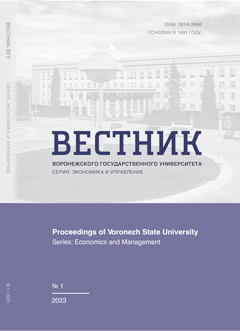Оценка уровня социально-экономического развития Ростовской области на основе сбалансированности региональных подсистем
Аннотация
Предмет. Условия, определяющие сбалансированность развития региональных подсистем, зависят от многих факторов, влияющих на степень регионального развития конкретного региона. В современных условиях сбалансированность развития региональных подсистем напрямую влияет на уровень социально-экономического развития региональной экономики.
Цель. Обоснование методического подхода к оценке уровня социально-экономического развития региона через призму сбалансированности его подсистем (социальной, экологической, экономической).
Методология. Методология исследования основана на системном подходе; в работе использовались: общенаучные и специальные аналитические методы ‒ логического анализа, которые применялись при исследовании методик оценки сбалансированности регионального развития, структурно-логического анализа, позволяющего упорядочить и уточнить терминологию в понятийном аппарате «сбалансированного развития региона», обобщения, группировки (при проведении отбора статистических показателей). Также в работе использованы экономико-математические и экономико-статистические методы при анализе и оценке связей между показателями, в том числе метод индексных взаимосвязей. Он позволяет определить степень влияния одного показателя на другой и оценить их взаимосвязь. Для наглядной демонстрации результатов исследования и аналитических данных применяется метод визуализации. С его помощью можно представить полученные результаты в графическом или диаграмматическом виде, что помогает лучше понять их суть и сделать выводы. При анализе баланса составляющих подсистем региона (социальной, экологической, экономической) применяется сравнительный и экономический анализ. Сравнительный анализ позволяет определить различия и сходства между этими составляющими и оценить их влияние на общую картину развития региона. Экономический анализ позволяет выявить экономические факторы, влияющие на состояние региона, и оценить эффективность функционирования его подсистем. При обосновании набора показателей и оценке эффективности функционирования региональных подсистем (социальной, экологической и экономической) используется метод экспертной оценки, что позволяет получить более объективные и обоснованные данные для анализа и оценки деятельности региона.
Результаты. Полученные результаты указывают на несовершенную систему развития Ростовской области, где социальные, экологические и экономические подсистемы не сбалансированы. Оценка сбалансированности регионального развития показала низкий уровень хозяйственной активности региона, который составляет 1,9 баллов, что ниже среднего значения (от 2 до 3 баллов). Этот показатель указывает на нестабильное состояние социально-экономической системы, поэтому требуется создание механизма для регулирования баланса целевых характеристик системы. Это будет являться основополагающим направлением для будущих исследований.
Обсуждение результатов. Полученные результаты сопоставлены с выводами исследователей, осуществлявших оценку уровня социально-экономического развития региона в указанные временные периоды на основе оценки сбалансированности региональных подсистем; делающих прогнозы относительно перспектив регионального развития.
Выводы. Проведенный анализ позволил сделать выводы о содержательной характеристике сбалансированности регионального развития как результата влияния экономических, социальных и экологических факторов на подсистемы региона; элементном составе интегральных показателей оценке сбалансированности региональных подсистем в частности и регионального развития в целом, включающем содержательную сторону оценки социально-экономического развития региона; особенностях методического подхода, основанного на бальной оценке показателей регионального развития.
Литература
Барабаш, Д. А. (2014). Комплексный подход для оценки сбалансированности регионального развития. Научно-Технические Ведомости Санкт-Петербургского Государственного По-Литехнического Университета. Экономические Науки, 1(187), 42–53. [Barabash, D. A. (2014). Complex approach for assessing the balance of regional development. Nauchno-Technical Vedomosti of St. Petersburg State Po-Litechnical University. Economic Sciences, 1(187), 42-53. (In Russian).]
Болтов, Р. В., Карелин, О. И., & Семашко, А. В. (2016). Сбалансированность развития территорий. Евразийский Союз Ученых, 4(25), 109–110. [Boltov, R. V., Karelin, O. I., & Semashko, A. V. (2016). Balanced development of territories. Eurasian Union of Scientists, 4(25), 109-110. (In Russian).]
Бродская, Т. Г. (1991). Сбалансированность регионального воспроизводства. Изд-во ЛФЭИ. [Brodskaya, T. G. (1991). Balanced regional reproduction. LFEI Publishing House. (In Russian).]
Гамидуллаева, Л. А., Грошева, Е. С., Белоградова, О. А., & Шевченко, Д. Н. (2022). Сбалансированное развитие территории: подходы к определению и оценке. Модели, Системы, Сети в Экономике, Технике, Природе и Обществе, 3, 25–41. [Gamidullaeva, L. A., Grosheva, E. S., Belogradova, O. A., & Shevchenko, D. N. (2022). Balanced development of the territory: approaches to definition and assessment. Models, Systems, Networks in Economics, Technology, Nature and Society, 3, 25-41. (In Russian).]
Даванков, А. Ю., & Яцукова, Н. Л. (2015). Трёхфакторная модель оценки сбалансированности развития региональных подсистем. Вестник Челябинского Государственного Университета, 18(373), 28–38. [Davankov, A. Y., & Yatsukova, N. L. (2015). Three-factor model for assessing the balanced development of regional subsystems. Vestnik of Chelyabinsk State University, 18(373), 28-38. (In Russian).]
Дохолян, С. В. (2022). Сбалансированное развитие экономики региона: теоретический аспект. Региональные Проблемы Преобразования Экономики, 10(144), 57–65. [Dokholyan, S. V. (2022). Balanced development of regional economy: theoretical aspect. Regional Problems of Economic Transformation, 10(144), 57-65. (In Russian).]
Ендовицкий, Д. А., Трещевский, Ю. И., Канапухин, П. А., Кособуцкая, А. Ю. (2023). Эмпирический анализ и прогнозирование динамики инновационного развития регионов России. Вестник ВГУ. Серия: Экономика и управление, (1), 51–64. [Endovitsky, D. A., Treshchevsky, Y. I., Kanapukhin, P. A., Kosobutskaya, A. Y. (2023). Empirical analysis and forecasting of the dynamics of the innovative development of Russian regions. Proceedings of Voronezh State University. Series: Economics and Management, (1), 51–64. (In Russian).] https://doi.org/10.17308/econ.2023.1/10932
Ефимова, О. В. (2023). ESG аналитика в системе принятия инвестиционных решений: в поисках существенной информации. Вестник ВГУ. Серия: Экономика и управление, (2), 3-17. [Efimova, O. V. (2023). ESG analytics in investment decision making: in search for material information. Proceedings of Voronezh State University. Series: Economics and Management, (2), 3-17. (In Russian).] https://doi.org/10.17308/econ.2023.2/11096
Ибрагимхалилова, Т. В., & Лукьянченко, Н. Д. (2017). Социальный ориентир трансформационного периода в Донецкой Народной Республике. Торговля и Рынок, 1, 93–100. [Ibragimkhalilova, T. V., & Lukyanchenko, N. D. (2017). Social reference point of the transformation period in the Donetsk People's Republic. Torgovlya i Rynok, 1, 93-100. (In Russian).]
Калинников, М. Ю. (2005). Теоретико-методические основы концепции устойчивого развития региона. Региональная Экономика: Теория и Практика, 9, 14–18. [Kalinnikov, M. Y. (2005). Theoretical and methodological foundations of the concept of sustainable development of the region. Regional Economics: Theory and Practice, 9, 14-18. (In Russian).]
Корчак, Е. А. (2020). Тенденции и проблемы устойчивого сбалансированного развития. Фундаментальные Исследования, 3, 60–65. [Korchak, E. A. (2020). Trends and problems of sustainable balanced development. Fundamental Research, 3, 60-65. (In Russian).]
Красносельская, Д. Х., & Тимирьянова, В. М. (2022). Оценка полицентричности систем расселения: чувствительность к методам, количеству наблюдений и уровню агрегирования данных. Вестник Магнитогорского Государственного Технического Университета Им. Г.И. Носова, 20(4), 144–153. [Krasnoselskaya, D. H., & Timiryanova, V. M. (2022). Estimation of polycentricity of settlement systems: sensitivity to methods, number of observations and level of data aggregation. Bulletin of Magnitogorsk State Technical University Im. G.I. Nosov, 20(4), 144-153. (In Russian).]
Ксенофонтов, В. И. (2010). Подходы к оценке уровня социально-экономического развития региона в условиях его сбалансированного развития. Вестник Иркутского Государственного Технического Университета, 7(47), 235–239. [Ksenofontov, V. I. (2010). Approaches to assessing the level of socio-economic development of the region in the conditions of its balanced development. Vestnik Irkutsk State Technical University, 7(47), 235-239. (In Russian).]
Павлов, Ю. В. (2020). Баланс системы расселения региона: оценка по закону Ципфа и влияние на ре-гиональное развитие. Вопросы Территориального Развития, 8(2). [Pavlov, Y. V. (2020). The balance of the regional settlement system: estimation by Zipf's law and the impact on re-gional development. Issues of Territorial Development, 8(2). (In Russian).] https://doi.org/10.15838/tdi.2020.2.52.1
Садыков, А. И. (2022). Особенности процесса сбалансированного регионального развития в истори-ческой ретроспективе. Вестник Евразийской Науки, 14(6). [Sadykov, A. I. (2022). Features of the process of balanced regional development in historical retrospect. Bulletin of Eurasian Science, 14(6). (In Russian).]
Татаркин, А. И., Даванков, А. Ю., Пряхин, Г. Н., Седов, В. В., & Шумаков, А. Ю. (Eds.). (2016). Управление сбалансированным развитием территориальных систем: вопросы теории и практики. ЧелГУ. [Tatarkin, A. I., Davankov, A. Y., Pryakhin, G. N., Sedov, V. V., & Shumakov, A. Y. (Eds.). (2016). Management of balanced development of territorial systems: issues of theory and practice. ChelSU. (In Russian).]
Трещевский, Ю. И., Праченко, А. А., Гарин, Л. К. (2022). Неформальные институты регионов как инструмент поиска направлений социально-экономического развития. Вестник ВГУ. Серия: Экономика и управление, (3), 30–42. [Treshchevsky, Y. I., Prachenko, A. A., & Garin, L. K. (2022). Informal institutions of the regions as a tool for finding pathways for socio-economic development. Proceedings of Voronezh State University. Series: Economics and Management, (3), 30-42. (In Russian).] https://doi.org/10.17308/econ.2022.3/10018
Ушакова, О. А. (2012). Природно-ресурсный потенциал и стратегия развития региона. Вестник Оренбургского Государственного Университета, 8(144), 163–168. [Ushakova, O. A. (2012). Natural-resource potential and the strategy of regional development. Vestnik of Orenburg State University, 8(144), 163-168. (In Russian).]
Шнипер, Р. И. (1979). Региональные предплановые исследования: Экономический аспект. Наука. [Schnipper, R. I. (1979). Regional pre-planning studies: The economic aspect. Science. (In Russian).]
Atkinson, G., Dubourg, R., Hamilton, K., Munasinghe, M., Pearce, D., & Young, C. (1997). Measuring sustainable development: macroeconomics and the environment. In Measuring sustainable development: macroeconomics and the environment. Edward Elgar Publishing Ltd. https://doi.org/10.5860/choice.35-3982.
Kuik, O., & Verbruggen, H. (Eds.). (1991). In Search of Indicators of Sustainable Development. Kluwer, Dordrecht.

Это произведение доступно по лицензии Creative Commons «Attribution» («Атрибуция») 4.0 Всемирная.























